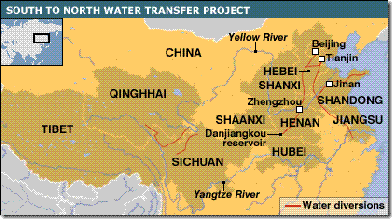China - The Tibet Dilemma
Tibet is back in news and this time not for Beijing-Lhasa Train project, but for the pro-autonomy and Anti-Chinese demonstrations. The current wave of violence happens at a time when China can least afford it and is a renewed wave that takes place after a gap of nearly 20 years. In 2008 Beijing will host the Olympics and the current demonstrations don't augur well with its plan to emerge on the world space as a super power in a otherwise uni-polar world dominated by the US.
The Chinese build up for the Olympics has meant that most of the development and investments have been focused on Beijing and a couple of large cities. This development has been at the cost of Rural China. The situation has reached a point where the Communist Party leaders from the provinces surrounding Beijing have started complaining about the water shortage. A case in point being the province of Hebei which has been suffering from a severe drought but has to make arrangements to supply a additional 300m cubic meters of back-up supplies for the 16 Million residents of Beijing.
A critical issue which continuously bothers the Chinese officials as well as Foreign Policy Experts across the world is whether China will implode due to this unbalanced growth. Will this implosision happen before or after the Olympics and what will be the impact of a unstable China on the US and other Western Economies?
From a geo-political perspective it would be worth conducting a scenario analysis of the shape of things to come. China today is straddled with immense internal pressures due to unbalanced growth and it will require to do some huge change in the policy to make growth more equitable for the common Chinese. Communist states have always been pretty efficient in controlling dissidents, but typically once the peoples hands have been unbound they have gone for the Political Juggler of their masters. It will be a interesting change to monitor if it was to happen pro-actively at the hands of the communist.
China will have to make the transition to a more inclusive growth model. The ramifications of this change could mean:
- a slowdown in China's growth rate
- a short-term drop in the metal and crude prices in the global market
- Short to medium term impact on the availability of manufactured good from china in reliable manner
- creation of a federal system of governance
- and a long term shift towards a multi-party democracy
All of these and specially democracy and a federal structure will benefit china in the long term. Some real changes will also happen in terms of the current power projection by the PLA and the military-industrial complexes that it controls. The current Tibet crises is only a precursor of challenges that China may face prior the the Olympics and immediately after the event. India due to its immediate proximity will be impacted by any changes in China and needs to closely monitor the situation through all possible means.

Comments